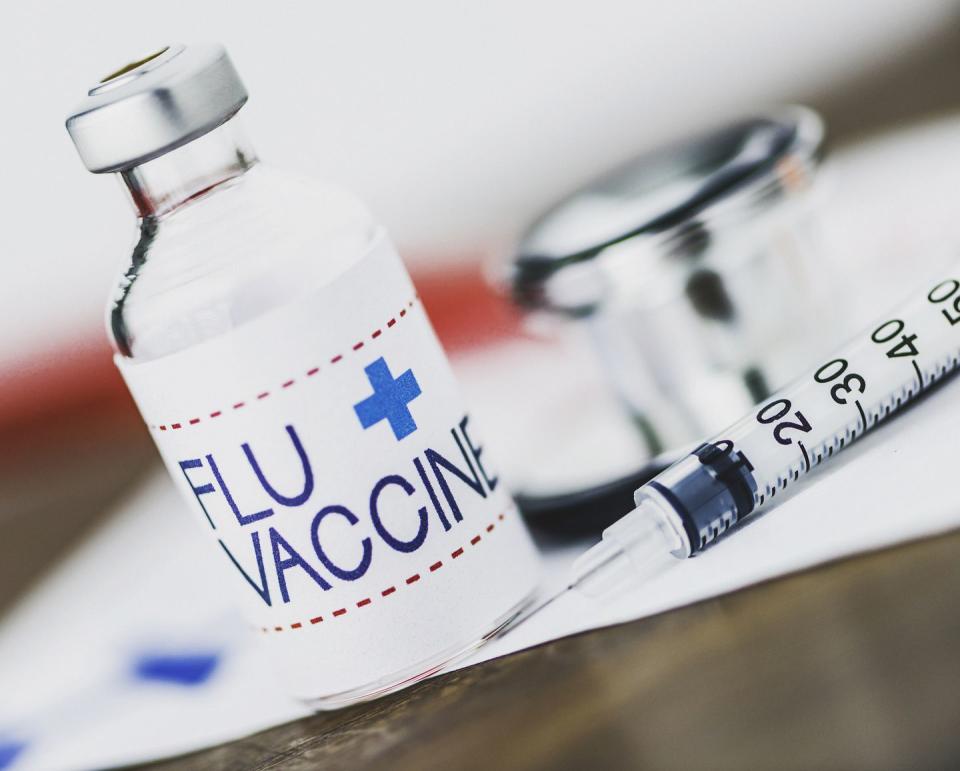You Absolutely Cannot Get the Flu From the Flu Shot

Every year, without fail, someone is going to swear up and down to you that the flu shot gave them the flu. “But I was just fine on Tuesday,” they’ll say. “Then on Wednesday, I got a flu shot, and by Friday I had the sniffles and a sore throat.” And that's why so many people skip getting vaccination, but can the flu shot really give you the flu?
While your friend may have gotten sick — and may even have contracted the flu — but it almost definitely wasn’t as a result of their flu shot, says Gary LeRoy, MD, a family physician in Dayton, OH, and president of the American Academy of Family Physicians. “If you get a flu shot, in all likelihood the only effect is that you get will be protection against the flu,” he says. “The flu shot, however, does not protect you from getting a cold, and you have to remember that you are getting your flu shot right in the middle of cold and flu season,” LeRoy adds.
The difference between a cold and a flu? LeRoy likens it to the difference between a child’s toy choo-choo train knocking into you and a locomotive bearing down on you. One is annoying, the other can kill you (more than 60,000 Americans died of complications from the flu last year).

LeRoy points out that many years ago, the flu vaccine was created from a weaker strain of the flu, so many people still believe they are getting injected with a live virus. But the current flu shot is made from a virus that has been “scrambled up, deactivated, and destroyed,” says LeRoy — it is not capable of giving you the flu.
Okay, but can you still get the flu even if you’ve had the shot?
Yes. While the currently available vaccines protect against the four most common strains, new strains pop up every year, so the flu shot is not 100% perfect. But studies have shown that the vaccine reduces your chance of contracting the flu by 40 to 60%; even if you still get sick, you will most likely get a much milder version than if you had not been vaccinated at all. According to one study, among adults who were hospitalized with the flu, those who had been vaccinated were 59% less likely to be admitted to the ICU than their unvaccinated peers, and they spent four fewer days in the hospital.
LeRoy also points out that it takes about two weeks for the immune system to “rev up” and fully protect you after you get the vaccine, so it is possible to come down with the flu if you are exposed to the virus in the first few days after getting your shot. But again, this is despite the flu shot, not because of it.
What are the main side effects of a getting a flu shot?
A small percent of people will experience minor side effects from the flu shot. These can include:
Irritation, redness, or swelling at the injection site
Mild headache, fever, nausea
Muscle aches
LeRoy points out that all these symptoms should go away in a day or two. “You can put an ice pack on the site of the injection to help with soreness and swelling and take an over-the-counter anti-inflammatory, such as ibuprofen,” he suggests.
The onset of any minor cold-like symptoms just means your immune system is doing its job, he adds. “The immune system is reacting to the antigen in the vaccine; if you get a little feverish or a little sore throat, it should go away within 48 hours. It’s that toy-train version of a cold that is preventing you from getting run over by the giant locomotive.”
In very rare instances, some people can have an allergic reaction to the flu vaccine. According to the CDC, the reactions could include:
Difficulty breathing
Hoarseness or wheezing
Swelling around the eyes or lips
Hives
Paleness
Weakness
A fast heart beat or dizziness
If you have any of these reactions, call 911 or go to the hospital immediately.
The CDC recommends that almost everyone should get a flu vaccine, with just a few exceptions:
Babies under 6 months old
People who had an allergic reaction to the flu vaccine
People who have Guillain-Barré syndrome (GBS)
In the past, people with a severe, documented egg allergy were cautioned against getting a flu vaccine, since the virus for the vaccine is typically grown in a culture using egg proteins, explains LeRoy. But there are now two different versions of the flu vaccine that are completely egg-free, according to the CDC; ask your doctor which vaccine is appropriate for you.
Despite the possibility of small side effects and the chance that you might still get the flu even after you’re vaccinated, LeRoy urges everyone to err on the side of safety. “I had a family with three kids in my office the other day, and the kids were all getting all their regular immunizations, but the parents didn’t want to get them the flu vaccine,” he recalls. “I asked why not, and the dad said, ‘We’re a healthy family — we don’t get colds or flus.’ But the flu is a respiratory illness, spread by touching and breathing, so if your child is around any other human beings, they’re can get the flu. And the fact is, children can die from the flu.”
You Might Also Like

